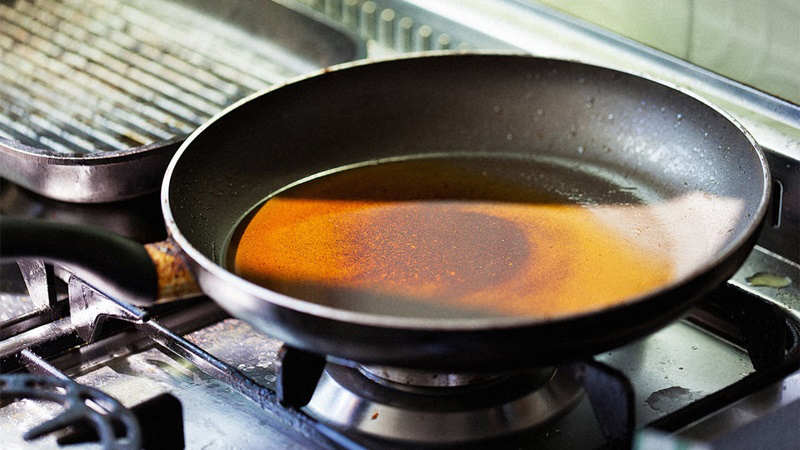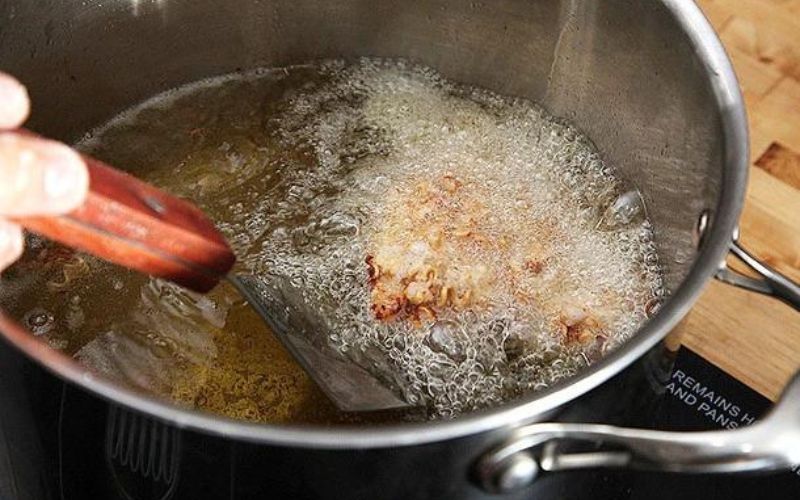Edible oils play a crucial role in providing essential energy to our bodies and supplying important fatty acids that our bodies cannot produce on their own, such as omega-3 and omega-6.
During the cooking process, oils not only enhance the flavor but also contribute to the appealing appearance of the dish. Additionally, oils are excellent heat conductors, ensuring even cooking and moisture retention, thus minimizing the risk of burning. Some edible oils have a high smoke point, making them ideal for high-temperature cooking methods such as frying and stir-frying.
However, edible oils are not always beneficial to our health. Improper use or choosing the wrong type of oil can be detrimental to our bodies and lead to the risk of developing serious illnesses. A classic example is the use of oil that has been reused multiple times for frying.

Oils add flavor and enhance the appearance of dishes during cooking.
Negative Impact of Reusing Frying Oil
Reusing frying oil is not uncommon in daily life. During parties or gatherings, many families tend to prepare deep-fried dishes to enhance the flavor. When there is leftover oil, some people may feel reluctant to discard it and instead continue using it for subsequent meals.
In some eateries, to cut costs, people repeatedly use cheap edible oils until they turn “pitch black.” When we are busy and have to eat out, unknowingly choosing dishes fried in this type of oil can be detrimental to our health.
According to experts, edible oils typically contain various nutrients, preservatives, and emulsifiers. When heated to high temperatures, these compounds can undergo changes and produce potentially harmful substances.
During the initial frying process, the nutrients in the oil are absorbed into the food, resulting in minor alterations, which is why you may notice a change in the oil’s color. If the same oil is repeatedly used for subsequent frying, the high temperatures will accelerate the formation of harmful compounds such as aldehydes and acrylamide.

Edible oils contain various nutrients, preservatives, and emulsifiers.
In summary, here are some of the harmful effects of reusing frying oil. Consumers should pay special attention to the following:
Promotes Inflammation in the Body
As mentioned earlier, when edible oil is subjected to heat multiple times, it undergoes complex chemical reactions, leading to the formation of compounds such as aldehydes and acrylamide. These compounds have the potential to trigger inflammation and may exacerbate inflammatory responses in the body when consumed.
Additionally, this process generates free radicals – unstable molecules that can damage cells and tissues by oxidizing cellular components. This oxidation not only weakens the immune system but also contributes to the development of chronic diseases such as cardiovascular disease and cancer.
Impacts the Nervous System
When edible oil undergoes repeated heating, its chemical structure changes, resulting in the formation of harmful compounds such as aldehydes and free radicals. These aldehyde compounds can be detrimental to nerve cells, affecting brain function and the nervous system, thereby increasing the risk of neurological disorders such as Alzheimer’s and Parkinson’s disease.
Accelerates Premature Aging
Reusing frying oil results in the accumulation of various toxic compounds, and when consumed, they increase the production of free radicals in the body. These free radicals can attack and damage cells, hindering the recovery and regeneration processes, leading to premature aging, the appearance of wrinkles, and noticeable signs of aging.
Increases the Risk of Cancer
During the frying process, edible oils undergo complex chemical reactions, forming compounds such as acrylamide and oxidized lipid products. Acrylamide is known to be a mutagenic substance closely associated with the development of various types of cancer.
When we consume fried foods prepared with repeatedly used oil, our bodies absorb these harmful compounds, increasing the risk of developing malignant tumors. Therefore, it is essential to minimize the use of this type of oil to protect our health.

Consuming fried foods prepared with repeatedly used oil increases the risk of developing malignant tumors.
How to Safely and Economically Use Old Frying Oil
In general, edible oils tend to oxidize when exposed to air. When heated to high temperatures and reused multiple times, the concentration of toxic substances in the oil increases significantly. Not only does the flavor of the oil change, affecting the taste of the dish, but its safety profile also diminishes.
Ideally, we should use just enough oil for each cooking session to minimize waste. Discarding edible oil after frying can be wasteful, while reusing it may pose health risks. Therefore, you can consider the following methods to safely reuse oil:
After frying, filter the oil to remove any residue. This oil can be added to a pot of braised fish right after turning off the heat, not only enhancing the flavor but also adding richness to the dish.
You can also use this oil for certain types of salad dressings.
Exploring the Pros and Cons of Sleeping in an Air-Conditioned Room
Is sleeping with an air conditioner a good idea? As concerns over the adverse effects of air conditioning on our health increase, it’s important to understand the risks and rewards of using air conditioning while sleeping. Let’s examine the benefits and drawbacks of sleeping with an air conditioner, and the protective measures one should take.





































